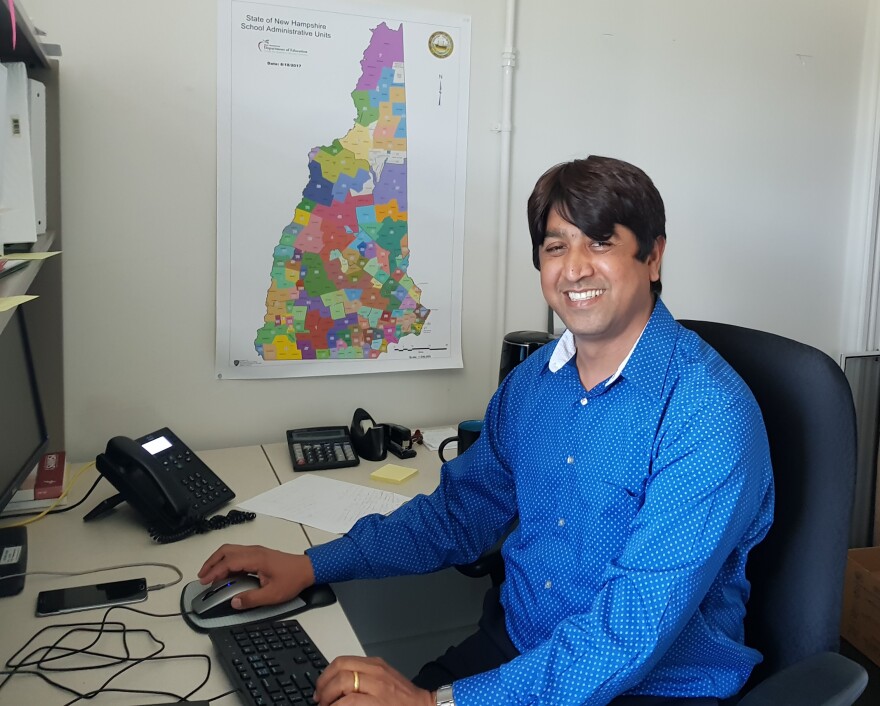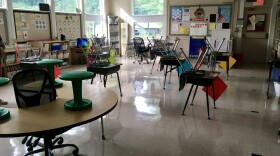On a warm, muggy Friday morning in the middle school’s library, 22 chairs are set around tables, in a u-shape.
Barbara Slayton is making sure the projector’s running. She’s the coordinator of school wellness at the Franklin School District, and she requested this training, after attending one herself a few months ago.
Slayton says with recent racially charged incidents around the state she wants her schools to be better prepared to serve an increasingly diverse group of students.
“You hear about events that happen. In Oyster River or Claremont or any of those places and then people scramble in response, ‘Oh, no, this is happening in our community,’” she said.
Running today’s training is Bhagirath Khatiwada.
He was hired in December by the Department of Education to help districts make their curriculums more inclusive, and to answer questions from teachers and administrators on diversity.
It’s the first time there’s been someone at the state level who’s doing this kind of work. His position is funded by a federal grant from the Substance Abuse and Mental Health Services Administration, a branch of the U.S. Department of Health and Human Services.
These trainings though, aren’t mandatory for schools. Those that are interested have to call Khatiwada and request a training.
Today, he’s here with two colleagues.
“I always feel excited,” he said as he set up his presentation. Each time, he focuses on how this training can help participants work cross-culturally.

Khatiwada explains, his goal today is modest: to get participants thinking about their own backgrounds and how that might affect the way they interact with people who are different.
Teachers file in and find a seat. They’re all white.
Khatiwada stands at the front of the room, with a reassuring smile on his face.
He wants to make this point: there’s more to diversity than just race.
So, for the morning’s first activity, he asks people to describe their own culture in three words. Everyone stands up, and like a game of popcorn, one person starts with a ball, says their name, their descriptors and calls on the next person and throws the ball to them.
A number of people say they’re educators or parents. Some talk about hobbies, like gardening or coordinating celebrations. Some mention their heritage: Italian American; growing up in the South and then moving to New Hampshire.
It’s one thing to recognize these differences, like whether you garden or hate getting dirty, and another, Khatiwada says, to know how to handle differences in the classroom.
He describes this as a “level one” training. With that, it’s important to get everyone on board with basic definitions, like cultural competence. Here’s how Khatiwada defines it:
“Cultural competence is the ability of an individual or organization to work cross culturally, respecting differences and creating an inclusive environment. ”
That means making sure school policies and practices are accessible and respectful to everyone, no matter where they come from, what they look like, or—especially in less wealthy districts like Franklin—how much money they might have.
Khatiwada gives teachers and staff an activity to practice: They have to read through situations, and as a group, decide: Does the action show cultural competence? Cultural incapacity? Or cultural intolerance?
One group reads the following scenario: Families or staff wearing culturally distinctive clothing or hairstyles are looked at with curiosity at best, or seen as strange.
Some wonder if it’s cultural incapacity -- people know there’s a difference, and they may care, but they just don’t know what to do about that difference.
After some back and forth, they decide this is cultural intolerance because there’s not an understanding of why someone would be wearing culturally distinctive clothing or hair, and therefore, they’re seen as strange.
This example, and all the others Khatiwada passed out, are based on real incidents from around the state’s schools, hospitals and nonprofits.
When the groups come back together, some people say this was a tough activity.
As the session wraps up, Khatiwada congratulates the participants on their work, and he reminds them this is just a start.
“We don’t know all the cultures we interact with. But it doesn’t mean we’re doing wrong. If there is willingness to learn about new culture, about the culture we interact, that’s a process. That’s how we move forward.”
This was Jenn Daniel’s first diversity training. She’s in her second year of teaching geometry at Franklin High School.
“I was worried it was going to be really boring, and it wasn’t, so that was awesome,” she said.
Daniel says she left knowing she could do something about making her classroom more inclusive and open to other cultures, even as she’s teaching her students about angles and the Pythagorean theorem.
“They’re not going to come out perfectly model citizens after one semester of class. But it might start the change that happens to have them realize just how diverse our world is, I guess,” she said.
This is what Khatiwada wants to see.
He’s a former teacher himself, and he knows how hard this work can be.
And, he was a refugee, so he knows what it’s like when people don’t get where you’re coming from. He moved to Concord in 2008, after many years in a camp in Nepal. When he was 15, Khatiwada and his family were forced to leave Bhutan.
Like many refugees in this country, he had to deal with stereotypes, biases, and people questioning his legal status here. But he sees all of that as a problem that’s less about the individual and more about society. One that he thinks he can make better.
“Oftentimes people are not aware about those things, and it's not their fault. It is a matter of education. They need more education,” he said.
These days, Khatiwada feels more at home in New Hampshire. If you ask him how he’d describe himself -- that same question he asks teachers at his trainings sessions -- here’s what he’d say.
“I’m a father. I’m a New American, and I’m an educator.”
In the nine months at this job, he’s lead 13 trainings, like the one here in Franklin.
He’s also been fielding calls from districts across the state.
Khatiwada says he can work more closely with schools, providing guidance and support, and more in-depth trainings, if they want to take a hard look at revamping their curriculum or policies.
But, he says with 165 districts in New Hampshire, there’s still a lot of work ahead.








